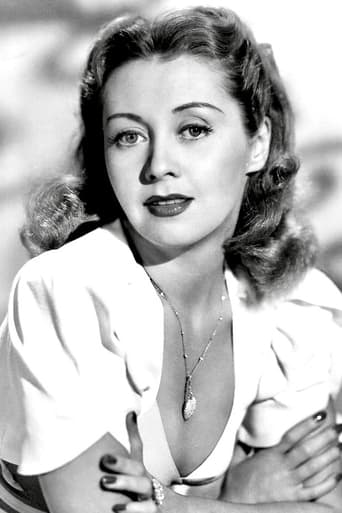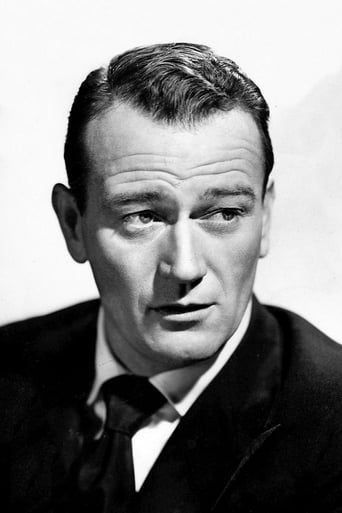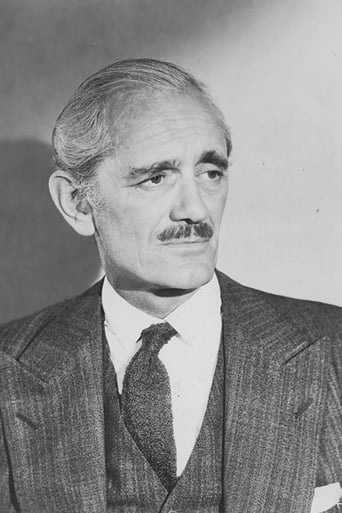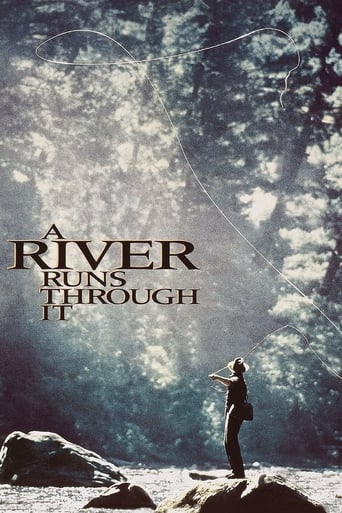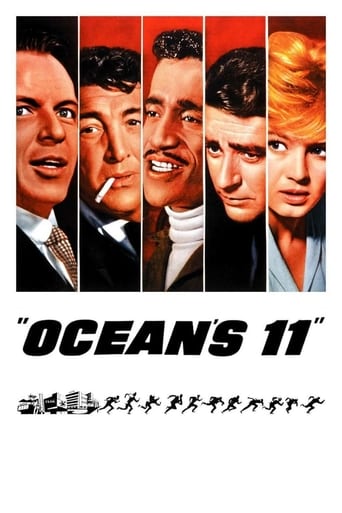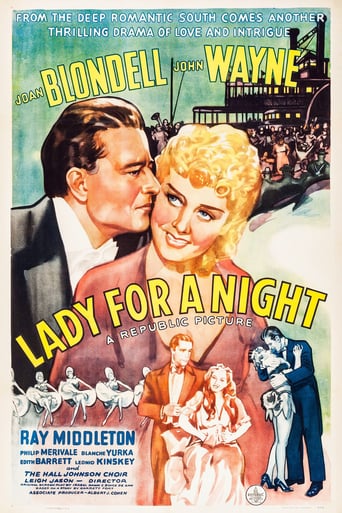

Lady for a Night (1942)
Gambling boat operator Jenny Blake throws over her gambler beau Jack Morgan in order to marry into high society.
Watch Trailer
Cast
Similar titles
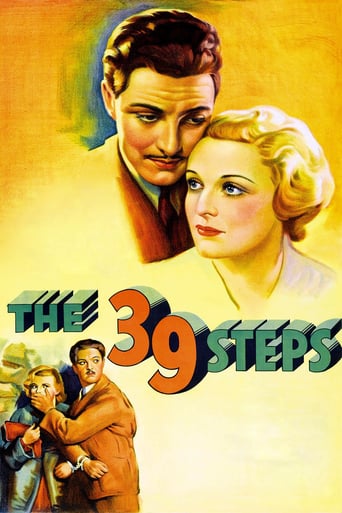
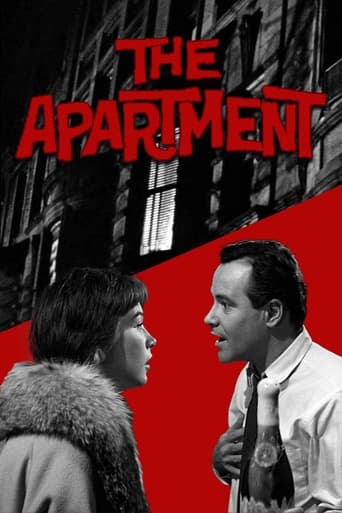
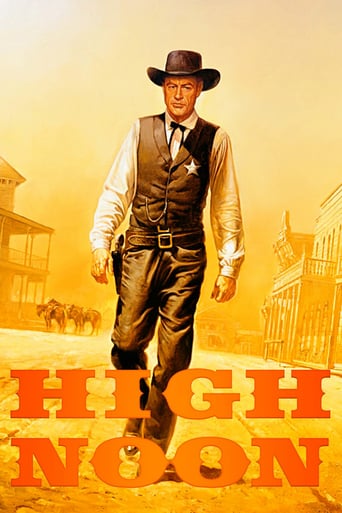
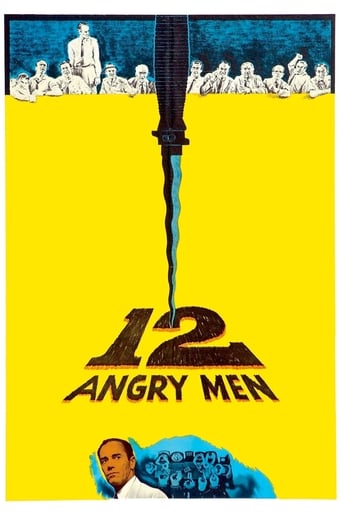
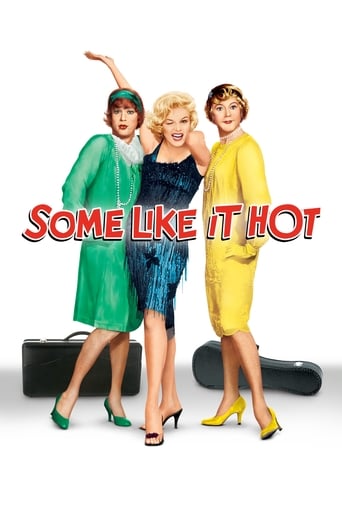
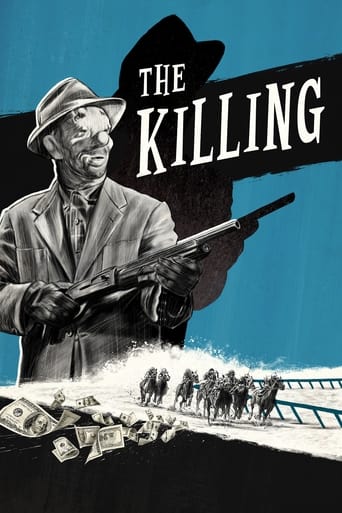
Reviews
Good , But It Is Overrated By Some
This movie was so-so. It had it's moments, but wasn't the greatest.
The film's masterful storytelling did its job. The message was clear. No need to overdo.
By the time the dramatic fireworks start popping off, each one feels earned.
" . . . for cotton to come back, for the ghosts of their sons: zombies, the living dead who haven't the decency to lie down and stay buried," Jenny rails at the Court of Confederate (or Red State) Public Opinion during the climax of LADY FOR A NIGHT. At a time when many if not most Americans suspect that shadowy Ted Cruz operatives assassinated Originalist U.S. Supreme Court Justice Antonin Scalia after the latter preliminarily--and privately--revealed to Ted's henchmen that Cruz is INELIGIBLE to run for President under Scalia's prevailing Originalism Doctrine, LADY FOR A NIGHT also involves a no-autopsy poisoning victim. With Scalia dead and "The Fix" in for Cruz in Cleveland, Jenny's worst fears seem likely to be realized next year: President Cruz will allow the 30 "Red States" to Reimpose Race-Based Slavery, as all Constitutional Amendments are nullified except for No. 2 (the Right to Armory Muskets). Though Donald Trump is not yet assassinated as of this writing, his comments about The Trash "rigging the System" ring truer now than in Jenny's LADY FOR A NIGHT day. (After supporting Freddie Gray, Prince died mysteriously today; Donald could be next.) JFK was invited to Red Cruz State Texas and got whacked there in the 1960s. It's been all downhill for America ever since.
My earliest recollection of Joan Blondell is from the mid-Fifties TV series 'The Life of Riley' in which she had the role of next door neighbor Honeybee Gillis. Like a lot of actresses I've run across since then, I never realized how good looking she was until I caught some of her earlier work in pictures. A couple others that come to mind are Bette Davis and Angela Lansbury. I don't think I've ever seen Blondell looking this glamorous before, and if you want to make that before and after comparison yourself, get hold of the fifth season Twilight Zone episode 'What's in the Box' and you'll see what I mean.One of the interesting things here is that Blondell is actually top billed over John Wayne, who got his start in pictures before the actress but who's fortunes didn't start to rise until that big breakout in 1939's "Stagecoach". They start out as a couple in the story before Blondell's character Jenny Blake decides to short cut her way into society by marrying an alcoholic playboy portrayed by Ray Middleton. However when she moves into the family mansion 'The Shadows', she quickly realizes that she's an intruder in a world in which she doesn't belong, and the rest of the upper crust around town let her know it.Through it all, Jackson Morgan's (Wayne) a pretty good sport about it, and maneuvers things behind the scenes to soften Jenny's hard landing when she learns what rotten characters her in-laws are. Mother-in-law Julia (Blanche Yurka) even frames her for murder before it's all over - talk about nasty relatives! What might put off potential viewers if you haven't seen pictures of the era like this, are the way some scenes are handled concerning black characters. In particular, Morgan delivers a sit up and take notice line when he chides Jenny's black maid Chloe (Hattie Noel) with "...get out, or I'll ship you back to Africa"! With the time frame of the story taking place shortly following Reconstruction days, the treatment of blacks in the story is still fairly subservient, but Chloe and fellow Alderson domestic Napoleon (Lew Payton) handle things with humor and relative good cheer.Speaking of which, I couldn't get over how closely Chloe came to just about perfectly describing what it felt like to get drunk, following a lively party at the Alderson's - "Every time I lays down, the floor rears up, looks me in the eye and sneers". The reason I bring it up is one time I had a bit much myself and I recall feeling pretty much the same way as Chloe. With the bed spinning in the room, the only safe place was the floor, but I thought I'd miss it!
Feeling low?Life getting you down?I've got just the thing for you..... "Lady for a night"(pun intentional?)set in Memphis during Mardi Gras with a cast of several,most of whom are masters of hyperbole.There are truly terrible songs,some dancing from Miss J.Blondell whose thighs are just a tad thick for such extreme exposure,a rather fey performance from Mr J.Wayne (and you don't see that very often) and an opening crowd scene that rapidly accelerates out of the control of director Leigh Jason - a man who was to gratefully grasp at the straw later offered to him by the nascent TV industry. Miss Hattie Noel is tremendous as Miss Blondell's maid.Forget the tremulous whispers of racism,this is a full - on portrait of a strong feisty black woman of her era.She is brash,confident,loud and very,very funny.It may be nominally Miss Blondell's movie,but it is Miss Noel I remember with the most pleasure. Full of Southern stereotypes with dodgy accents,"Lady for a night" satisfies all the criteria for a Camp Masterpiece.Miss Blondell's Gaming House looks as if it might fall down if someone leaned against a wall,Mr Wayne with a top hat is a sight to see indeed and the evil female relative is a dead ringer for Mrs Danvers. About as true a picture of The South as "Gone with the wind",but a whole lot funnier.You may boo and hiss at will - and you will most certainly laugh,loud and often.What more could you want?
First off, anyone who watches this film because it's a John Wayne film (like me) may be disappointed because he is really a supporting actor. This is because he'd only been a regular starring actor in small-budget B-Westerns and in larger budget films he was mostly in secondary roles until the mid-to-late 1940s. Second, because the Wayne screen persona was not yet solidified, lovers of the Duke might also be shocked to see that for most of the film he plays a love-sick man who loses his woman to another. Had the later Wayne been in such a situation, he no doubt would have slugged the other suitor and drug off the woman for some lovin'--John Wayne style!! The real star of this film is Joan Blondell. Unlike Wayne, her star was starting to fall, as her prime as a leading lady was definitely the 1930s. Here she is a bit older and heavier, but this is also perfect for her role as a casino owner and singer.Blondell's ambition is to leave the casino life to Wayne and marry a society man in order to ensure herself a play in polite society. Unfortunately, she's seen as a woman of low virtue and the only man she can find to marry is a drunk from a previously wealthy and well-heeled family.Her welcome into the new family was not surprisingly rocky, as one of her new sister-in-laws was just plain evil. The longer the film progresses, the more evil and juicy this role becomes--making this a pretty exciting film and characterization. Ultimately, the plot takes a very dramatic twist near the end until it is all wrapped up nicely in the end.The only serious negative about the film is that the plantation she moves to in Reconstruction-era Memphis is ridiculous and full of racist stereotypes. No, the Blacks do not eat watermelon or act as bad as Stepin Fetchit, but they play out an even more insidious role--happy Blacks who are content with the good treatment by their White "betters". This over-idealistic view of the South is insulting and may raise a few eyebrows. Try to look past this to see that you still have the basis of a very good film.
